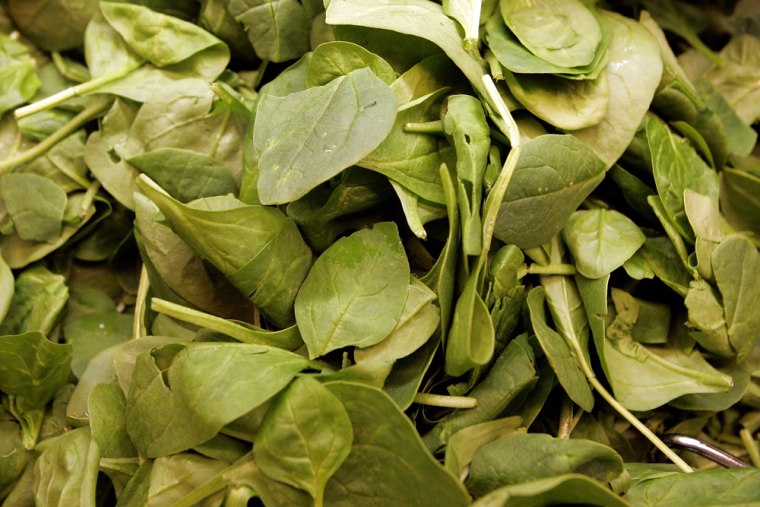Once again, a nasty bacterium called E. coli 0157:H7 is making national news, reminding us that the U.S. food supply is not as safe as it could be.
The current spinach outbreak is not an isolated case, and the E. coli problem is not limited to one type of produce. This type of bacterial contamination has been going on for years, and the problem seems to be getting worse, according to Lee Riley, professor of epidemiology and infectious diseases at the University of California in Berkeley.
Riley knows a lot about E. coli 0157:H7. In 1981 he worked at the Centers for Disease Control and investigated the first E. Coli case in hamburger meat. He predicts we will “definitely see more cases involving spinach, lettuce and other salad greens” in the years ahead. Part of the problem is the Food and Drug Administration cannot regulate on the farm “until people are getting sick,” says Caroline Smith DeWaal, director of food safety at the Center for Science in the Public Interest. So the agency tries to manage this hazard by asking the industry to make changes voluntarily. Clearly this voluntary approach is not working.
“The FDA needs better tools,” Smith DeWaal says. “They need stronger authority. They need more people and resources to enforce rules both on the farm and in produce packing and processing plants."
FDA officials did not immediately respond to a request for comment.
The FDA could take a lesson from the U.S. Department of Agriculture. After serious outbreaks of E. coli in meat in the mid-1990s, the USDA took strong action. It implemented new rules and performance standards. Since then the problem of E. coli in ground beef has declined dramatically. At the same time cases of E. coli in produce, which is regulated by the FDA, have gone up.
With meat, proper cooking will kill any harmful bacteria present. But you aren’t going to cook your salad greens. Washing reduces the bacteria count but does not completely eliminate it. Because there is no guaranteed household solution to this problem, it must be dealt with on the farm before the product makes it to market.
The FDA is well aware of the problem. In 1998 it issued a “Guide to Minimize Microbial Food Safety Hazards for Fruits and Vegetables.” These voluntary guidelines were supposed to help growers and packers implement safer practices. They didn’t.
On Nov. 4, 2005, the FDA sent a letter to California firms that grow, pack and process fresh lettuce, telling them of its “serious concern with the continuing outbreaks of foodborne illnesses associated with the consumption of fresh and fresh-cut lettuce and other leafy greens.”
The letter “encourages” the industry to take steps to provide a safe product to the consumer. “In light of continuing outbreaks,” the letter said, “it is clear that more needs to be done.”
E. coli contamination is not limited to bagged salad or salad ingredients. But many past outbreaks have been traced to pre-packaged and pre-washed greens, including spinach, romaine, iceberg and leaf lettuce.
Smith DeWaal says the outbreaks from bagged greens “have been broader and more widespread because of the distribution system.” Greens are mixed and sealed, then shipped to many places.
Riley tries to buy fresh greens that are not pre-packaged. “If it’s bagged, it’s been handled multiple times,” he says, “increasing the risk for contamination.”
If not properly refrigerated, he says, the bag “becomes an incubator for the bacteria.” Greens that are sold loose are less likely to be exposed to this incubator effect.
But even if the greens are sold loose, they still could be contaminated by bacteria from soil or water can be sucked up into a plant’s root system. “Experimentally, it’s also been shown that the bacteria can make it into the leaf,” he says. If that happens, no amount of washing will remove it.
We eat a salad for dinner every night in my house. When the spinach recall was announced, my wife asked if we should skip the salads for a while. What may seem like an overreaction is a question many people are now asking.
No one has suggested that we stop eating fresh produce; fruits and vegetables are good for us. And when you consider how much produce is consumed each year, the risk of getting sick is very small.
And yet “you need to assume all fruits and vegetables have been contaminated with bacteria and handle them with care,” advises Don Mays, Senior Director of Product Safety and Consumer Science at Consumers Union. This includes organic and non-organic, packaged and non-packaged.
“We can’t tell you that one type is better than the other,” Mays says.
Even if the salad greens come pre-washed, “don’t assume it’s thoroughly clean,” Mays says. Consumer Reports recently tested some pre-washed bagged salads and found that one of every 62 bags contained a strain of E. coli, although not necessarily to most dangerous kind.
While washing fresh produce won’t eliminate the possibility of getting sick, it can certainly reduce the amount of contamination present.
Here’s the process Consumer Reports suggests:
- Wash your hands with hot soapy water
- Wash the produce thoroughly in a running stream of water
- Dry the produce with a paper towel
- Clean the food preparation surface with a soapy water or disinfectant solution
- Wash your hands again in hot soapy water
In 2002, dramatic changes took place in the meat industry after Con Agra was forced to recall 19 million pounds of ground meat. This spinach recall will have a huge economic impact on growers in California. If they take a big enough hit, it could be the tipping point for the produce industry.
